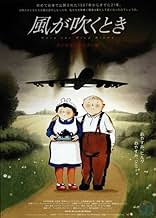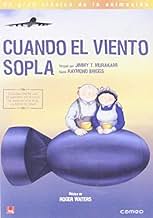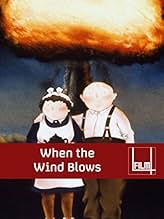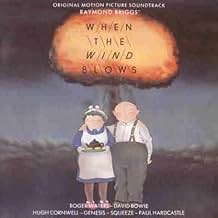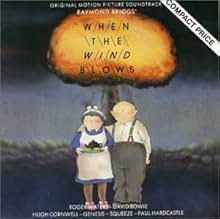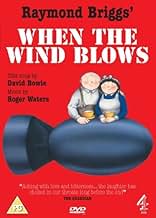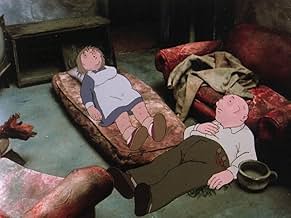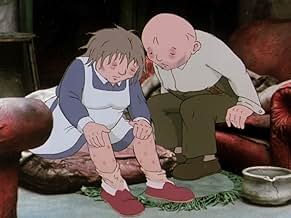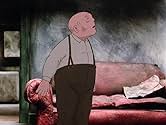Ajouter une intrigue dans votre langueA naive elderly British rural couple survive the initial onslaught of a nuclear war.A naive elderly British rural couple survive the initial onslaught of a nuclear war.A naive elderly British rural couple survive the initial onslaught of a nuclear war.
- Réalisation
- Scénario
- Casting principal
- Récompenses
- 1 nomination au total
- Jim Bloggs
- (voix)
- Announcer
- (voix)
- Self
- (images d'archives)
- (non crédité)
- Self
- (images d'archives)
- (non crédité)
- Self
- (images d'archives)
- (non crédité)
- Self
- (images d'archives)
- (non crédité)
Avis à la une
While Mick Jackson's telemovie Threads remains the screen's most potent account of mass panic on apocalypse day, this British to-the-frame adaptation of Raymond Briggs' graphic novella is unquestionably the most humane. Say hello and wave goodbye then, to Jim and Hilda, our naive retired home counties couple who, on hearing of an imminent World War III, set about merrily obeying the ridiculous instructions from government protect and survive pamphlets. They whitewash the windows (to shield the radiation), stock up on supplies (a tin of Christmas pudding) and cheerfully anticipate a Blitz-style cosy-up sipping Olvaltine under Anderson shelters.
At first, it plays out like a black comedy - just as the bomb hits, dim Hilda goes to get the washing in - but as the insidious crackle of fall-out settles and the sickness sets in, the movie reveals its true nature: an unbearably intimate, gently accentuated tragedy with a tenacious pacifist streak. Blending 2D cells with 3D modelling, director Jimmy Murakami is technically adventurous but crucially, his connection to Briggs' material is total. In fact, with its working class nuances, droll dialogue and mundane aura , you sense that if Mike Leigh made cartoons, the results wouldn't be too far from this.
This film takes a different approach: the format (animated) and the setting (rural England) perfectly match the soothing government messages: build a shelter, keep some food and drink - you'll be alright.
But then the story is continued through to the (very painful) end: there is no more government, there is no more mailman, there is
no more you....
I have watched a lot of movies and I expect to watch a lot more movies before I am through, but I won't see anything quite like this one. If you think you have seen everything and had everything possible thrown at you from a TV/Cinema screen -- then think again.
When The Wind Blows must be the most disturbing film I have ever seen -- and it is a low budget cartoon with a PG certificate! The movie starts by playing for laughs and introducing us to the daily routine of our elderly couple.They are living in the past and think of war in a kindly way. This is to soften us up for what follows -- and what follows will stay with you for the rest of your life.
Having your emotions manipulated by cinema is nothing new, but this film uses real government information and very real scenarios.
If only more people could see this film and debate the messages it contains we would have a safer and better world.
Le saviez-vous
- AnecdotesDavid Bowie was originally slated to record several songs for the film but was only able to contribute the title song due to time constraints regarding his then-upcoming album "Never Let Me Down". Roger Waters contributed to most of the film's songs instead.
- GaffesAt the beginning of the scene in which Jim and Hilda are bedridden, Hilda's feet are missing for a few frames as the camera pans across.
- Citations
[dying of radiation poisoning]
Hilda: Shall we... pray, dear?
Jim: Pray?
Hilda: Yes.
Jim: All right then... But... to who?
Hilda: God, of course.
Jim: Oh, oh, oh, I see... Yes, yes... Would that be the correct thing?
Hilda: It can't do any harm, dear.
Jim: Ok, um... Here it goes... Dear sir...
Hilda: No, that's wrong, dear.
Jim: Well, uh... How, how do you start?
Hilda: Our God...
Jim: -our help, in ages past...
Hilda: That's it, dear. Keep it up.
Jim: Almighty and most merciful father...
Hilda: That's good.
Jim: Dearly beloved... we are gathered... unto thee. I shall fear no evil. Thy rod and thy staff comfort me all the days of my life.
[beginning to suffocate]
Jim: Lay me down in green pastures... I... I can't remember anymore.
Hilda: That was nice, dear. I liked the bit about the green pastures.
Jim: Oh, yes, yes. Into the valley of the shadow of death...
Hilda: Oh, no more love. No more.
Jim: ...rode the six hundred.
[they die]
- Crédits fousAfter the end credits, Morse code can be heard in the background. The code, when translated, means "MAD". MAD is an abbreviation for the term "Mutually Assured Destruction".
- Versions alternativesFrom the Castilian Spanish dubbing, Fernando Rey and Irene Gutiérrez Caba were cast to be the voices of the main characters.
- ConnexionsFeatured in Years Ahead: Épisode #5.1 (1986)
- Bandes originalesWhen the Wind Blows
Written by David Bowie and Erdal Kizilcay
Performed by David Bowie
Produced by David Bowie and David Richards
Meilleurs choix
- How long is When the Wind Blows?Alimenté par Alexa
Détails
Box-office
- Montant brut aux États-Unis et au Canada
- 5 274 $US
- Week-end de sortie aux États-Unis et au Canada
- 3 597 $US
- 13 mars 1988
- Montant brut mondial
- 5 274 $US
- Durée1 heure 24 minutes
- Couleur
- Mixage
- Rapport de forme
- 1.37 : 1
Contribuer à cette page



